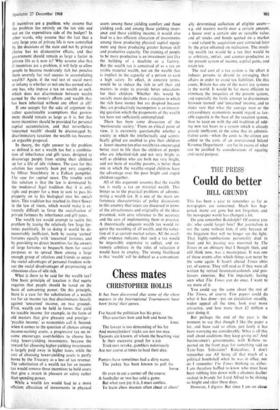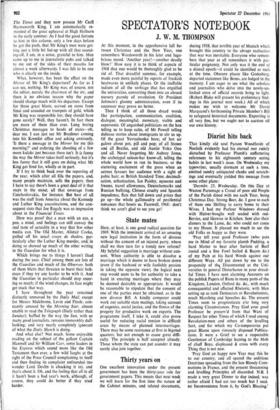Could do better
THE 'PRESS BILL GRUNDY
This has been a year to remember as far as newspapers are concerned. Much has hap- pened, many are gone but not forgotten, and the newspaper world has changed a lot.
Do you remember Randolph? Of course you do; who could forget him? But journalism is not the same without him, if only because of the litigation that will no longer see the light. That highly-rumbustious personality died in June and his passing was mourned by The Times in an obituary that I thought then, and still think now, was a masterpiece. It was one of those events after which things can never be the same again. It hasn't altered Times obits yet, of course. They still read as if they were all written by retired lieutenant-colonels and pro- fessors emeritus. But I'm impatient; having seen what The Times can do once, I want to see more of it.
You could say the same about the rest of The Times, of course. Few papers could do what it has done—put on circulation steadily, widen appeal all the time, look ever more attractive, and lose more than £2 million a year doing it.
But perhaps the end of the year is the moment to say that though I like the paper a lot, and have said so often, just lately it has been worrying me considerably. What is all this stuff about coalitions they keep giving us? And businessmen's governments, with Robens re- ported on the front page for something said on Tyne-Tees Television? Ridiculous; I don't remember our Alf being all that much of a political bombshell when he was in office, nor do I remember The Times :thinking so, either. I am therefore baffled to know who must have been rubbing him down with a chamois leather soaked in brandy for Lord Alfred to be shining so bright and clear these days.
However, I digress. But since I am on about
The Times and they now possess Mr Cecil • Harmsworth King, I am automatically re- minded of the great upheaval at High Holborn in the early summer. As I had the good fortune to hint in this column, only a few days before he got the push, that Mr King's men were get- ting just a little bit fed-up with all that sound- ing-off, I am, in a sense, grateful to him. Men came up to me in journalistic pubs and talked to me out of the sides of their mouths for almost a week afterwards. I was felt to be one who is clearly on the inside.
What, however, has been the effect on the Mirror of Mr King's departure? As far as I can see, nothing. Mr King was, of course, not the editor, merely the chairman of the tee, and there is no obvious reason why the paper should change much with his departure. Except for those great blasts, carved on stone from Sinai and sounded on trumpets of gold, which Mr King was responsible for; they should have gone surely? Well, they haven't. In fact there are more of them than ever. Long boring Christmas messages to heads of states—oh, 'dear me. I can just see Mr Brezhnev coming into his Kremlin office and asking anxiously, 'It there a message in the Mirror for me this morning?' and ordering the shooting of a few more kulaks just because there isn't. It is funny the way the Mirror takes itself seriously, but it's less funny that it still goes on doing what Mr King got fired for, wholly or in part.
If I try to think back over the reporting of the year, which after all fills the papers, and, many people maintain, sells the papers, then I have to say there's been a great deal of it that stay's in the mind; all that coverage from Czechoilovakia, for instance. But best of all was the stuff from America about the Kennedy and Luther King assassinations, and the con- sequent riots that Joe Rogaly was so impressive about in the Financial Times.
Here was proof that a man with an eye, a pen, a mind, and feelings can still convey the real taste of actuality in a way that few other media can. The Old Master, Alistair Cooke, pulled off his usual coups de thedtre, par- ticularly after the Luther King murder, and in doing so showed up much of the other writing in the Guardian for what it is.
Which brings me to things I haven't liked during the year. Chief among them are lots of the Guardian and much of the Observer, both of them blatts that threaten to burst their bob- stays if they try any harder to be with it. And the Guardian in particular should stop sneer- ing so much; if the wind changes, its face might get stuck that way.
I have throughout the year remained distinctly unmoved by the Daily Mail, except for Messrs Mulchrone, Levin and Flook; con- stantly amused by the Morning Star; almost unable to read the Telegraph (Daily rather than Sunday); baffled by the way the Sun, with so many good journalists, remains immovably dull- looking; and very nearly completely ignorant of what the. Daily Sketch is doing.
And what else? Not much. Some enjoyable reading on the subject of the gallant Captain Maxwell and Sir William Carr, some leaders in . the Express which sound more like the Old Testament than ever, a few wild laughs at the sight of the Press Council complaining to itself and then finding its complaint unfounded (no wonder Lord Devlin is chucking it in), and that's about it. Oh, and the feeling that all in all it hasn't been a bad year's work, although, of course, they could do better if they tried harder.



































 Previous page
Previous page